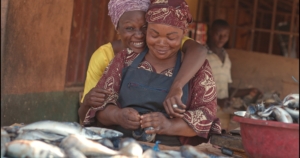Nigeria Invests $5 Billion Annually Towards Poverty Reduction
 A recent decision by the Federal Executive Council (FEC) of Nigeria approved an annual $5 billion trust fund aimed at reducing the effects of humanitarian crises on affected Nigerians, as well as a general reduction in poverty across the nation.
A recent decision by the Federal Executive Council (FEC) of Nigeria approved an annual $5 billion trust fund aimed at reducing the effects of humanitarian crises on affected Nigerians, as well as a general reduction in poverty across the nation.
The Humanitarian and Poverty Alleviation Trust Fund was approved by the FEC and unveiled by Nigeria’s Minister of Humanitarian Affairs, Betta Edu. The fund will be realized through the collaboration of public and private sectors, as well as philanthropic organizations and individuals.
“This, of course, is a victory for the poor and indeed would bring help and succor, which the Renewed Hope Agenda stands for,” Minister Betta Edu stated in Vanguard News.
Background
According to the Nigerian National Bureau of Statistics, it is estimated that approximately 63% of the population suffers from poverty. Moreover, more than half of the population does not have basic access to housing, health care, food, and clean energy. Of those affected by poverty, approximately 51% are children — two-thirds of children in Nigeria are victims of inadequate living conditions.
In response to concerns about these living conditions, Nigeria announced the Renewed Hope Agenda on October 17, where President Tinubu outlined the nation’s new strategies in poverty reduction. These include government restructures that will make poverty reduction a key focal point in order to provide effective implementations without the hindrance of government corruption. Furthermore, the government announced collaborations with private sector groups, such as the World Bank, to provide zero-interest financial support to the state’s national social safety net expansion program, which will deliver aid to vulnerable Nigerians. The recently announced Renewed Hope Agenda will act as a seven-year plan to aggressively address humanitarian crises and poverty in the country.
Expected Outcomes
With increased funding, the Nigerian government will be able to deliver new shelters to impoverished households, refugees and those suffering from disabilities. The agenda will deliver school meals to 10 million children across the nation, while also providing education to children who have previously been unable to access it.
The government will also be funding agricultural developments on 500,000 hectares of land, as well as providing farmers with 225,000 metric tons of fertilizers, in an effort to tackle food shortages. To strengthen the economy, the agenda will deliver support to an estimated 2 million beneficiaries in Nigeria through business grants.
With the combined annual dedication of $5 billion as well as the Renewed Hope Agenda, Nigeria is taking an aggressive and direct approach toward implementing poverty reduction. By working with private sectors and charity organizations to support these new, ambitious policies, the Nigerian government hopes to propel the nation into economic stability and improve the lives of many Nigerians who face the obstacles posed by poverty on a daily basis.
Final Thoughts
“Our objective is to lift millions of Nigerians out of poverty. Yet, this will only be possible with the cooperation of the people we seek to help. Let us continue to work together to achieve our collective goal of eradicating poverty in Nigeria,” said President Tinubu in his address to the nation.
– Remigius Kim
Photo: Pixabay
